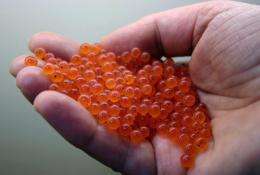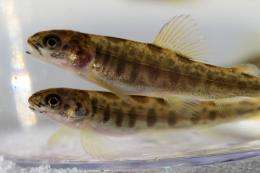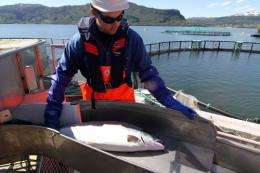Sterile farmed salmon can reduce genetic impact on wild fish

Interbreeding between escaped farmed salmon and their wild counterparts is a major headache for the aquaculture industry. Now Norwegian fish farming companies are raising one million sterile salmon in sea cages – for the purpose of research that may help to get the upper hand on this problem.
These sterile fish are triploids, a genetic condition induced by a non-GMO method developed through long-term Norwegian research efforts funded in part by the Research Council of Norway in close cooperation with the aquaculture industry.
"If we succeed in producing sterile salmon on an industrial scale, we can substantially reduce the negative genetic impact on wild fish populations," says Arne Herre Staveland, who heads farmed fish production at Eide Fjordbruk, one of the six aquaculture companies participating in the experiment.
Pressure-treating eggs
Triploid salmon can be produced by exposing salmon eggs to high pressure, a treatment that causes the offspring to receive the usual one set of chromosomes from its father but two from its mother. This method had been developed in the 1980s and was applied to e.g. rainbow trout in Scotland and Tasmania. But experiments with salmon were not successful; the test salmon were indeed sterile, but they became prone to skeletal deformities. Now, thanks to new knowledge in part from the sequenced salmon genome, the method has re-emerged as a potential solution.
"New research indicates that we can prevent the skeletal problems by modifying the diet," explains Geir Lasse Taranger of the Institute of Marine Research in Bergen. "Also, new molecular tools help us to better understand how triploid salmon respond to different environmental conditions, which enables us to develop better protocols for how to farm them."
"The new research also shows that triploidy makes salmon more sensitive to warmer temperatures and low oxygen concentrations," says Dr Taranger. "Triploid salmon appear to have different nutritional and environmental requirements than normal salmon, so we need to adapt the production methods."
Vaccine to prevent sexual maturation
Another method of producing sterile salmon is to develop a vaccine that inhibits the onset of sexual maturity. The Research Council's Large-scale Programme Biotechnology for Innovation (BIOTEK2021) is providing funding for research on both triploid salmon production and vaccine-based sterilisation.
Alongside these projects, the research community is continuing the comprehensive task of mapping the salmon genome, a project which continues to yield valuable knowledge for researchers targeting sterile salmon production as well as a host of other applications.

Working to keep aquaculture offshore
"As long as fish farming takes place in the ocean, there will always be the risk that fish will escape due to human error," cautions Nina Santi, head of R&D at the selective breeding company AquaGen. "So in order to avoid having to move production onshore, it is vital to work out a solution for sterile farmed fish."
AquaGen has been supplying the pressured-treated eggs that are now the sterile salmon being put to sea in cages this year. These experimental fish will be closely monitored from their fry stage until slaughter-ready.
Putting one million sterile salmon to sea is a milestone in this research, says Dr Santi. "It's important now that we make the leap of applying this method on a commercial scale. This is the final phase to be tackled."
Results ready in 2015
There are six aquaculture companies trying out the triploid salmon in northern, central and western Norway. These companies will gain important insights into feeding these sterile fish, and they also wish to find out whether it is possible to harvest as many triploids as conventional farmed salmon.
Compared to normal diploids, the triploid salmon grow faster in their freshwater stage and require a special diet with, for instance, extra phosphorous to prevent skeletal problems.
"If this is to succeed," says Dr Santi, "it is critical that the producers adapt their production regimes to accommodate the altered traits and utilise the advantages that triploids have to offer."

The first triploid salmon will be ready for slaughter in spring 2015, so the trials can be assessed soon thereafter.
Safeguarding animal welfare and biosafety
Changes in the production conditions and diet for sterile salmon raise issues relating to animal welfare and biosafety, points out Anne Ingeborg Myhr, Acting Director of GenØk ? Centre for Biosafety, based in Tromsø.
GenØk carries out research on ethical, legal and social aspects (ELSA) of biotechnology. These perspectives are also an integral part of the research on sterile salmon being funded under the BIOTEK2021 programme.
Dr Myhr lists a number of questions that need to be studied more closely: Do these fish experience pain? Does sterilisation have any undesired impact on swimming ability or gill activity? It cannot be assumed that sterile salmon are physiologically the same as conventional farmed salmon. They could almost be considered a new species.
"Using sterile fish in Norwegian aquaculture clearly has potential in helping to solve the challenges involving genetic impacts from farmed salmon escaping into open waters," says Dr Myhr. "The alternative of using vaccines to inhibit sexual maturation is a positive measure that can help to reduce the scepticism currently prevalent among consumers ."
The GenØk – Centre for Biosafety is also watchful for any unforeseen impacts of technological applications, such as the efficacy of the triploid vaccine, whether 100 per cent of the fish become sterile, and whether this is reversible if desired.
More information: The BIOTEK2021 programme
Provided by The Research Council of Norway














